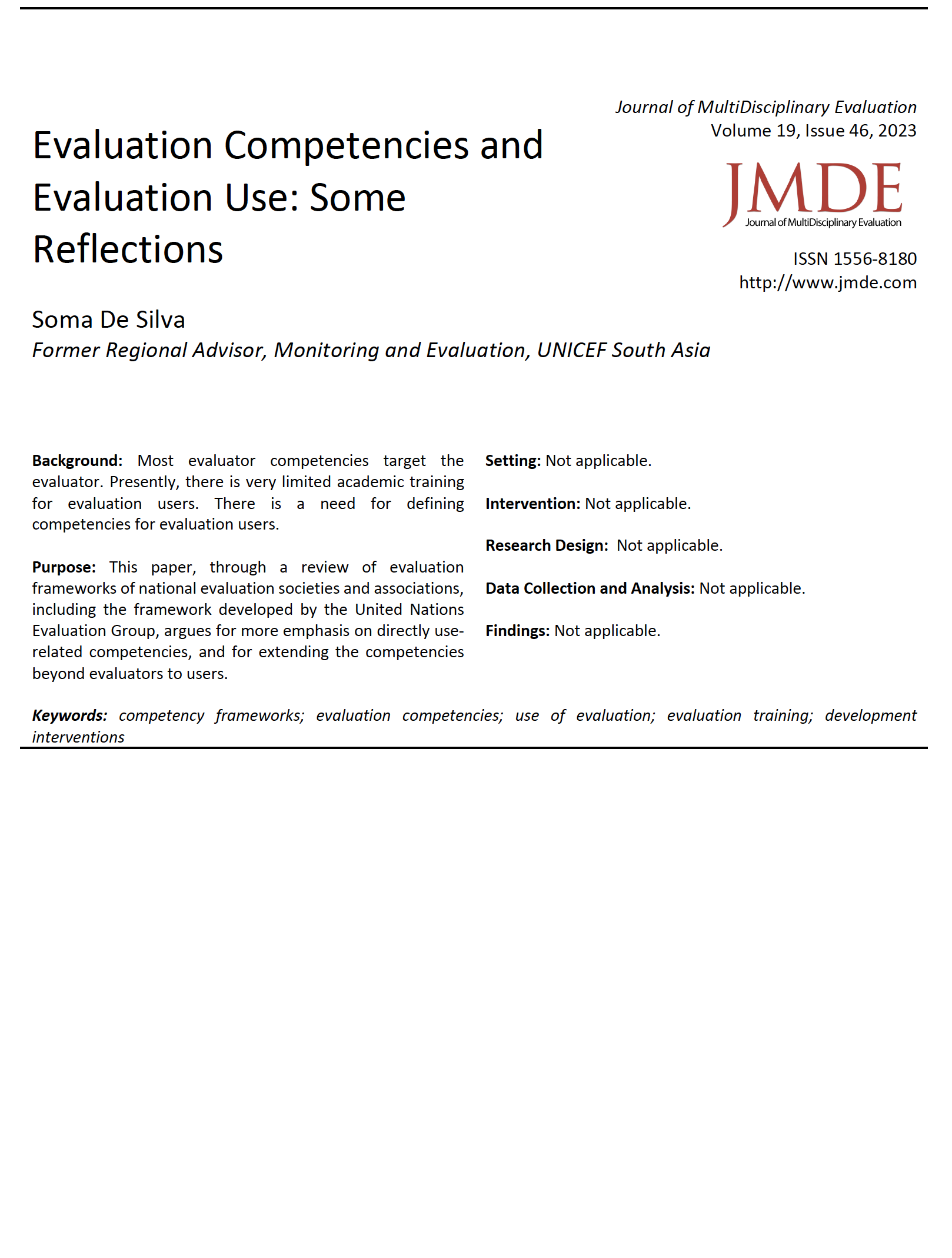Evaluation Competencies and Evaluation Use: Some Reflections
Main Article Content
Abstract
This article aimed to identify the emphasis on evaluation use within evaluation competency frameworks. A review of evaluation competency frameworks shows an underlying focus on evaluation use in all frameworks. Nevertheless, specific competencies explicitly focusing on evaluation use were incorporated in more recent frameworks, reflecting the increasing attention to evaluation use. A theory of change for evaluation use is proposed depicting the role of competencies of evaluators and critical users. The article argues for more emphasis on directly use related competencies and extending the competencies beyond evaluators to users. It proposes establishing standardized and up-to-date evaluation training in academic institutions to professionalize evaluation and thereby promote the integration of evaluation in development interventions.
Keywords: competency frameworks, evaluation competencies, use of evaluation, evaluation training, development interventions.
Downloads
Article Details

This work is licensed under a Creative Commons Attribution-NonCommercial 4.0 International License.
Copyright and Permissions
Authors retain full copyright for articles published in JMDE. JMDE publishes under a Creative Commons Attribution-NonCommercial 4.0 International License (CC BY - NC 4.0). Users are allowed to copy, distribute, and transmit the work in any medium or format for noncommercial purposes, provided that the original authors and source are credited accurately and appropriately. Only the original authors may distribute the article for commercial or compensatory purposes. To view a copy of this license, visit creativecommons.org
References
References
Aotearoa New Zealand Evaluation Association. (2011). Evaluator com¬petencies. https://anzea.org.nz/assets/Key-ANZEA-Files/110801_anzea_evaluator_competencies_final.pdf
American Evaluation Association. (2018). The 2018 AEA Evaluator Competencies. https://www.eval.org/Portals/0/Docs/AEA%20Evaluator%20Competencies.pdf
Australasian Evaluation Association. (2013). Evaluators Professional Learning Competency Framework.
Canadian Evaluation Society. (2018). Competencies for Canadian Evaluation Practice. Revised Version. https://evaluationcanada.ca/txt/2_competencies_cdn_evaluation_practice.pdf
Government of South Africa, Department of Performance Monitoring and Evaluation. (2014). Evaluation Competency Framework for Government. https://www.dpme.gov.za/keyfocusareas/evaluationsSite/Evaluations/Competencies_14%2007%2010.pdf
European Evaluation Society (2015). The EES capabilities framework. https://www.weitzenegger.de/content/wp-content/uploads/ees-evaluation-capabilities-framework-final.pdf
DeGEval. (n.d.). Recommendations on Education and Training in Evaluation Requirement Profiles for Evaluators. https://www.degeval.org/fileadmin/Publikationen/Publikationen_Homepage/Recom_Education_Training.pdf
Galport, N., & Azzam, T. (2017). Evaluator Training Needs and Competencies. American Journal of Evaluation. 38 (1), 80-100. DOI: 10.1177/1098214016643183 DOI: https://doi.org/10.1177/1098214016643183
International Institute for Environment and Development. (May 2017). Evaluation: a missed opportunity in the SDGs' first set of Voluntary National Reviews. Briefing. https://pubs.iied.org/17423iied
Inernational Labour Organization. (2016). Independent Evaluation of ILO's Evaluation Function – IEE, 2011–2016, Final Report. https://www.ilo.org/wcmsp5/groups/public/---ed_mas/--- eval/documents/ publication/wcms_545949.pdf
Joint Committee on Evaluation Standards. (2010). The program Evaluation Standards (3rd ed.). https://evaluationstandards.org/program/
King, J. A., Stevahn, L., Ghere, G., & Minnema, J. (2001). Toward a taxonomy of essential evaluator competencies. American Journal of Evaluation, 22, 229-247.
https://doi.org/10.1177/109821400102200206 DOI: https://doi.org/10.1177/109821400102200206
OECD/DAC. (2019). Criteria for Better Evaluation. Revised Evaluation Criteria Definitions and Principles for Use. https://www.oecd.org/dac/evaluation/revised-evaluation-criteria-dec-2019.pdf
Picciotto, R. (2011), The logic of evaluation professionalism. Evaluation, 17(2) 165-80. DOI: 10.1177/1356389011403362 DOI: https://doi.org/10.1177/1356389011403362
Podems, D. (2014). Evaluator competencies and professionalizing the field: Where are we now? The Canadian Journal of Program Evaluation, 28 (3), 127–136. DOI: https://doi.org/10.3138/cjpe.0028.012
Sachs, J., Lafortune, G., Kroll, C., Fuller, G., Woelm, F. (2022). From Crisis to Sustainable Development: the SDGs as Roadmap to 2030 and Beyond. Sustainable Development Report 2022. Cambridge University Press. DOI: https://doi.org/10.1017/9781009210058
Sarwar, M. B., & Nicolai, S. (2018). What do analyses of Voluntary National Reviews for Sustainable Development Goals tell us about 'leave no one behind'? Briefing. International Institute for Environment and Development (IIED). https://odi.org/en/publications/what-do-analyses-of-voluntary-national-reviews-for-sustainable-development-goals-tell-us-about-leave-no-one-behind/
Simon, B., Meyer, W., D’Errico, S., Schwandt, T., Lucks, D., Zhaoying, C., El- Saddik, K., Schneider, E., Taube, L., Anderson, S. & Ofir, Z. (2017). Evaluation: a missed opportunity in the SDGs' first set of Voluntary National Reviews'. International Institute for Environment and Development (IIED). http://pubs.iied. org/17423IIED/
Stevahn, L., King, J., Ghere, G., & Minnema, J. (2005) Establishing Essential Competencies for Program Evaluators. American Journal of Evaluation, 26(1), 43-59 DOI: 10.1177/1098214004273180 DOI: https://doi.org/10.1177/1098214004273180
SLEvA. (2021). Professionalization of evaluation in Sri Lanka. Competency Framework for Evaluators.
Swiss Evaluation Society (SEVAL). (2014). Evaluation Managers Competencies Framework: Tasks, Challenges and Competencies. SEVAL
UK Evaluation Society (2012) Framework of Evaluation Capabilities. 'Qualities and Dispositions' refers to those personal characteristics that enable evaluators to operate in difficult socio/political circumstances to deliver credible evaluation. https://www.evaluation.org.uk/app/uploads/2019/04/UK-Evaluation-Society-Framework-of-Evaluation-Capabilities.pdf
United Nations. (October 2015). A/RES/70/21. Resolution adopted by the General Assembly on 25 September 2015. https://www.un.org/ga/search/view_doc.asp?symbol=A/RES/70/1&Lang=E
United Nations Department of Economic and Social Affairs. (n.d.). Synthesis of Voluntary National Reviews 2017. https://sustainabledevelopment.un.org/content/documents/17109Synthesis_Report_VNRs_2017.pdf
United Nations Department of Economic and Social Affairs. (n.d.). Synthesis of Voluntary National Reviews 2018.
United Nations Department of Economic and Social Affairs. (n.d.). Synthesis of Voluntary National Reviews 2020. https://sustainabledevelopment.un.org/content/documents/27027VNR_Synthesis_Report_2020.pdf
United Nations Department of Economic and Social Affairs. (n.d.). 2021 Voluntary National Reviews Synthesis Report. https://sustainabledevelopment.un.org/content/documents/294382021_VNR_Synthesis_Report.pdf
United Nations Evaluation Group. (2008). Core Competencies for Evaluators of the United Nations System. https://www.alnap.org/help-library/core-competencies-for-evaluators-of-the-un-system
United Nations Evaluation Group. (2016). Evaluation Competency Framework. http://www.unevaluation.org/document/detail/1915
Wehipeihana, N., Baily, R., Davidson, E. J., & McKegg, K. (2014). Evaluator competencies: the Aotearoa New Zealand experience. The Canadian Journal of Programme Evaluation, 28(3), 49-69. DOI: https://doi.org/10.3138/cjpe.0028.007
Wilcox, Y. & King, J. A. (2014). A professional Grounding and history of the development and formal use of evaluation competencies. The Canadian Journal of Program Evaluation, 28 (3), 1–28. DOI: https://doi.org/10.3138/cjpe.0028.005

